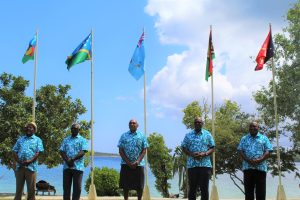Last week the 22nd Melanesian Spearhead Group (MSG) Leaders’ Summit was held in Port Vila, Vanuatu. The MSG is a regional body that includes Solomon Islands, Fiji, Vanuatu, and Papua New Guinea as well as the Kanak and Socialist National Liberation Front (FLNKS), an alliance of pro-independence political parties in New Caledonia.
The body had a number of critical issues to discuss, including regional security, climate change, and Japan’s discharging of nuclear wastewater into the Pacific. But the central issue to the organization itself was the prospective membership of the United Liberation Movement for West Papua (ULMWP).
It is the presence of FLNKS as a movement, rather than a sovereign state, that marks the MSG as a distinct regional body, and gives an indication of its values. The MSG’s statement of intent after its formation in 1986 said the group was driven by “a strong and shared political desire, for the entire decolonization and freedom of Melanesian countries and territories which were still under colonial rule in the South Pacific, thereby developing a stronger cultural, political, social and economic identity and link between the people and communities of Melanesia.”
This emphasis on decolonization, combined with the embrace of FLNKS, sends a strong signal to other Melanesian independence movements that may have a legitimate claim to be part of the organization. Both Vanuatu and Solomon Islands have often used their time at the annual United Nations General Assembly (UNGA) to highlight human rights concerns in West Papua, as well as directly advocate on behalf of the West Papuan independence movement.
Taking these signals seriously, the ULMWP has been pressing to gain membership in the MSG as a vital step to obtaining greater international legitimacy and reach its ultimate objective of independence from Indonesia.
However, as four of the five members of the MSG are sovereign states, they have strategic calculations that are often in tension with the values that the MSG was founded upon. Indonesia’s growing stature in the Indo-Pacific, and a willingness to use this burgeoning power for regional influence, has complicated the issue of West Papua for the MSG. Papua New Guinea, which shares a long land border and maritime space with Indonesia, especially has to be mindful of its relationship with its large and increasingly influential neighbor.
As a country with a significant Melanesian population, Indonesia was given associate status to the MSG in 2015. Jakarta claims Indonesia has a Melanesia population of 11 million people distributed over five of its 34 provinces (which would make it the largest Melanesian state). However, while the provinces of West Papua and Papua are recognized as being regions of Melanesian ethnicity, there remains some debate over classification of the inhabitants of the Maluku Islands and other provinces in eastern Indonesia.
Jakarta’s “Pacific Elevation” is Indonesia’s attempt to establish a more Pacific-facing posture, a way of expanding its regional engagement beyond ASEAN and its relationships in northeast Asia. But it has also been a strategy to blunt support for the ULMWP within the Pacific. And with this, it looks to have been successful.
The ULMWP’s previous applications for membership of the MSG have compelled the grouping to develop new guidelines that applicants would need to comply with to gain full membership. This has resulted in the ULMWP unifying all pro-independence groups into a single organization, creating executive, legislative, and judicial structures, and establishing formal agendas with detailed descriptions of its short-, medium-, and long-term political and social goals. The organization has done the necessary work to comply with the guidelines, but has still failed to gain approval.
The MSG Leaders’ Summit communique claimed that the ULMWP “does not meet the existing criteria” for membership, although it failed to explain the areas where ULMWP falls short. The communique also noted that there was a lack of consensus among MSG members, which is most likely the core reason to deny ULMWP’s application. PNG and Fiji plausibly are making strategic calculations that take their relationships with Indonesia into account.
Hoping to prevent West Papua from taking attention away from other issues at the next MSG summit, the group also issued a one-year moratorium on any new membership applications. This may also effectively be a signal for the ULMWP to not attempt another application.
Yet this does not mean the group has completely abandoned West Papua. The summit mandated the group seek closer collaboration with Indonesia “to draw special focus on the social, economic development and empowerment of the people of West Papua and the Papuan Provinces.” The hope is that in establishing some goodwill with Jakarta, the MSG can be influential in improving the conditions within West Papua (and Papua), even if this falls short of independence.

































